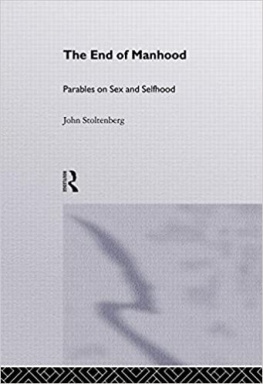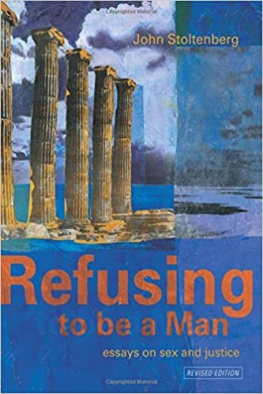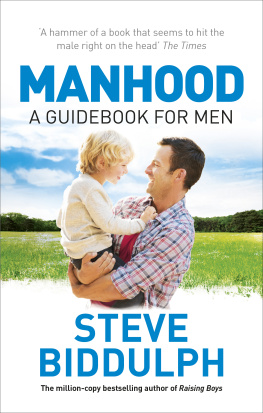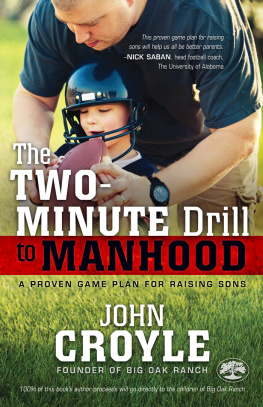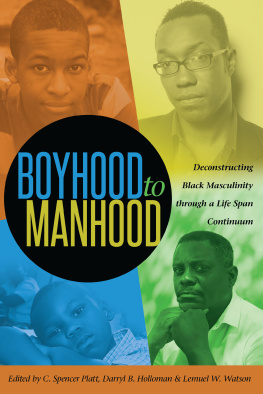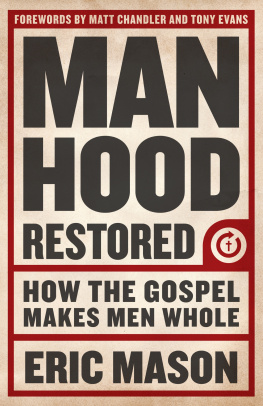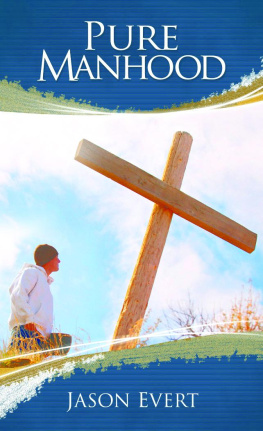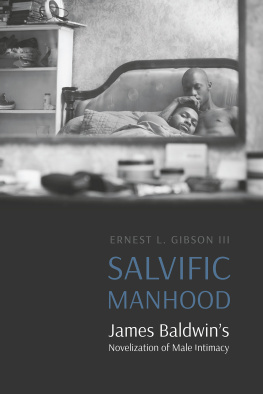THE END OF MANHOOD
In this practical follow-up to Refusing to Be a Man, John Stoltenberg speaks to men so that women can overhear about how the social construction of manhood operates in ordinary relationships. Using a variety of stories and illustrations, he makes everyday sense of interpersonal conflicts and internal dilemmas that distress mens lives, and he shows how the same dynamics drive the behavior of gangs, race-hate groups, and other warring male factions. Readers will find here new perspectives on intimacy, gender, and violence and be pushed to re-examine their ideas of manhood and gender identity generally. Stoltenbergs new introduction sets the book in academic context, summarizing the game theory of gender that underlies his work.
John Stoltenberg is the radical feminist author of Refusing to Bea Man: Essays on Sex and Justice (rev. edn, London and New York: UCL Press, 2000) and What Makes Pornography Sexy? (Minneapolis, Minnesota: Milkweed Editions, 1994). He is cofounder of Men Against Pornography.
THE END OF MANHOOD
Parables on Sex and Selfhood
Revised Edition
JOHN STOLTENBERG
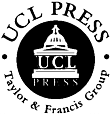
London
First published 1993 as The End of Manhood: A Book for Men of Conscience by Dutton, an imprint of New American Library
Revised edition published 2000 in the UK and the USA by UCL Press
11 New Fetter Lane, London EC4P 4EE
The name of University College London (UCL) is a registered trade mark used by UCL Press with the consent of the owner.
UCL Press is an imprint of the Taylor & Francis Group This edition published in the Taylor & Francis e-Library, 2005.
1993, 2000 John Stoltenberg
The right of John Stoltenberg to be identified as the Author of this Work has been asserted by him in accordance with the Copyright, Designs, and Patents Act 1988
British Library Cataloguing in Publication Data
A catalogue record for this book is available from the British Library
Library of Congress Cataloging in Publication Data
Stoltenberg, John.
The end of manhood : parables on sex and self hood/John Stoltenberg Rev. ed. p. cm.
1. Men Psychology. 2. Masculinity (Psychology) 3. Feminism. 4. Sex role. I. Title
HQ1090.S76 1999
155.632 dc20 991306
ISBN 0-203-97913-3 Master e-book ISBN
ISBN 1-85728-324-4 (hbk)
ISBN 1-85728-325-2 (pbk)
For Andrea,
who means courage
THE CORE OF ONES BEING
MUST LOVE JUSTICE MORE THAN MANHOOD.
Refusing to Be a Man
INTRODUCTION TO THE REVISED EDITION
Gender theory in the academy is sometimes like a private joke: You can get it if you are in on the jargon; but if you are not, you cant. Gender theory is rarely simply told. More often it is willfully obfuscated, propounded in sentences so packed with self-referential abstraction that they seem never to be about anything. Academic gender theorys relationship to peoples real lives can seem as tenuous as its hold on recognizable human speech.
I do not believe this must be. I believe that a radical investigation of gender a look at it by its roots can be done with everyday language about everyday experience. This method not only makes more sense, it also more accurately reflects our social reality. We all first learned to find a suitable niche inside the gender system through narratives of real life: stories and dramas in which we were shown our part and how to play it. This learning was interactive, for as we played our part well or poorly, we were made ever more mindful of what bad things can happen to us if we do not do better. As we acted in accord with our own designated niche, so also we acted in our dealings with other people in accord with theirs. The prescripts of transactional conduct not only kept everyone who abided by them stationed somewhere in the gender system; these rules also gave the whole system its narrative meaning and force. To step outside the strictures of gender to opt out of its demands in confidence, not disgrace we do not need esoteric theory, some cerebral mumbo-jumbo, but we do need to know how to reread those narratives of everyday life.
At no time in history have so many humans felt such a gaping discrepancy between the gender system that is given us and the selves we long to be. At no time in history have so many yearned for alternatives: ways to truly be oneself, without fear of failing at fitting into ones gender niche, without being punished, without being cast into exile. Especially among young people, pressing new questions about the meaning of gender and ones bodily experience of it have erupted in classrooms and chatrooms, in music and poetry, in costume and adornment, in memory and imagination, in sensation and sexuality. Some fine teachers have conscientiously responded to students questing with a host of new courses, based in feminism, that take a political and historical look at the lives of women. Such courses have functioned for many students as an autobiographical correlative, or as a lens through which to examine their own unease about the gender setup.
Other academicians, starting from the standpoint that gender is socially constructed (something feminists first figured out), have developed complex new theoretical discourses that promise if not answers at least rarefied ways of recasting the questions. You may not ever actually get practical answers to whatever first drew you to the study of gender theory, but by god youll be taught ways to ponder the perplexities so that you too can be as prolix as the professionals who have tilled and fenced the field. Regrettably, such obscurantism has often displaced feminisms more concrete critique.
The seekers who flock to the academy today, as much to find explanatory sanctuary from their gender dilemmas as to enjoy the company of one another, have a myriad of inward questions about erotic desire and desirability; about the size, shape, and look of their flesh; about their sexual rights and status, in both intimacy and the body politic; about feeling at odds with a gender ideal; about feeling ones niche does not fit. Frequently academic gender theory helps these seekers frame their burning questions inside larger issues with ever more gravity, and occasionally a seeker finds satisfaction in the cogitation perhaps even a career path. But if ones soul or selfhood is parched and thirsty for a solution to ones private disquiet in the gender setup, such curricular approaches deriving academic respectability in direct proportion to their opacity can appear like the mirage of an oasis, promising to slake ones thirst just because they are the only watering hole around.
But academic credibility and radical inquiry are not necessarily compatible. Nor, for that matter, are complexity and personally applicable truth.
What I propose in The End of Manhood is a personal methodology for a radical new look at gender. It begins with the notion that gender is an ethical construction. This starting point both refines and differs from the understanding, now widely accepted in the academy, that gender is socially constructed. Permit me to explain.
To say that gender is an ethical construction is to say that tracking all the familiar faades of gender as a social construct so-called sexual identities, sexual orientations, body types, self-presentations or performativities, communication styles, and so forth cannot disclose the dynamic transactional structure by which gender is constructed, just as a bookshelf full of dictionaries in different languages cannot explain what makes a sentence mean. As grammar makes sense of vocabulary, so too there is an underlying syntax that makes the surface markers of gender cohere and make sense. To say that gender is an ethical construction is to say that what fundamentally grounds gender personally and socially as a hierarchical binary is a system of valuing conduct, a codification of acts, which underpins all the trappings now recognized as gender expression. Once we parse the embedded value system in that conduct once we learn to read the systematic ethics that render gender meaningful in human affairs we can grasp the genome of gender, the foundational scripts whereby gender comes to act, look, feel, and seem real.

